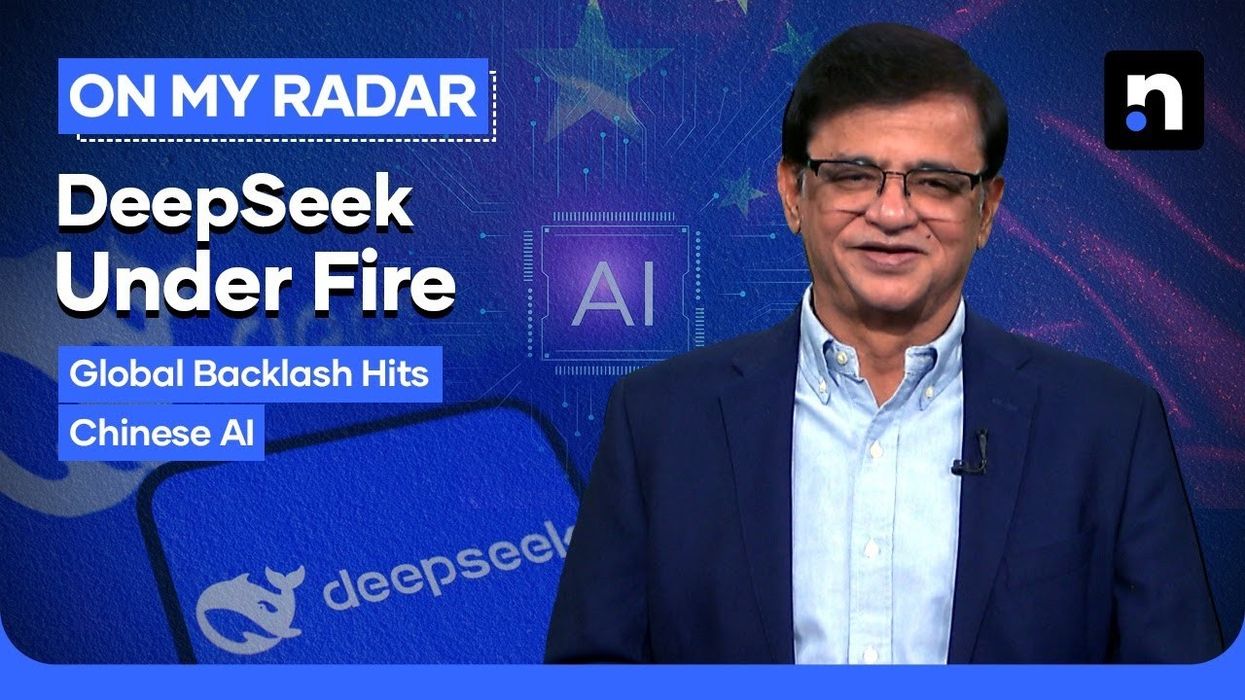News Desk
The News Desk provides timely and factual coverage of national and international events, with an emphasis on accuracy and clarity.
Chinese artificial intelligence chatbot DeepSeek has set off alarm bells across Western capitals, with the United States and its allies launching sweeping moves to ban or restrict the app, citing data security concerns and economic disruption.
Kamran Khan, in his vlog, said that the world may have entered a new kind of third world war — not through military confrontation, but through strategic and technological dominance in artificial intelligence.
DeepSeek, developed by Chinese engineers at a fraction of the cost of its Western rivals, has surged in popularity since its launch in January 2025. Within 24 hours, it became the top-rated free chatbot on both Apple’s App Store and Google Play across China, the U.S., the UK and much of Europe.
A low-cost disruptor
What has stunned Silicon Valley isn’t just DeepSeek’s performance — but its cost-efficiency. While U.S. tech giants spend hundreds of millions on training AI models, DeepSeek was reportedly built using only $6 million and 2,000 processing chips. In comparison, industry leaders like Meta’s LLaMA models require up to 16,000 chips.
“DeepSeek has outperformed ChatGPT, Meta’s LLaMA, IBM Watson and others,” Kamran Khan said. “It’s open-source, free to use, and already seen as a threat to Western digital dominance.”
The app’s creator, Liang Wenfeng, claims that DeepSeek rivals any AI in computing, coding, and data delivery. Its low barrier to entry and rapid user adoption have caught U.S. agencies off guard.
US and allies push back
In response, U.S. authorities have scrambled to contain what they view as a national security threat. NASA and the Pentagon’s Defense Information Systems Agency have warned employees against using DeepSeek. Other federal offices have also been instructed to avoid the Chinese chatbot.
Concerns center on fears that DeepSeek may grant Beijing access to sensitive user data. A bipartisan bill introduced in the U.S. Congress proposes up to 20 years in prison and a $1 million fine for using DeepSeek within the U.S.
Kamran Khan pointed out that the backlash mirrors past restrictions on Chinese tech firms. “This is not new. The U.S. banned Huawei, then TikTok. DeepSeek is the next in line,” he said.
Alphabet’s president of global affairs, Kent Walker, wrote just days after DeepSeek’s release that America’s AI lead “may not last long.”
Economic shock
On January 27 — the day after DeepSeek’s launch — U.S. tech stocks were hit hard. NVIDIA’s market cap dropped 18 percent, losing $590 billion. Broadcom shares fell 17 percent. Microsoft, Google and Amazon also saw their stocks slide.
That financial tremor, Kamran Khan said, “shook confidence in Silicon Valley’s AI dominance and forced the U.S. to act fast.”
U.S. President Donald Trump echoed those concerns, warning American tech firms to “wake up” or risk falling behind.
Global ripple effect
Following the U.S., Italy’s data protection authority banned DeepSeek nationwide. Taiwan and Australia soon followed suit. In South Korea, France, Ireland and Belgium, regulatory agencies have started public consultations on banning or restricting DeepSeek.
Texas became the first U.S. state to formally outlaw all software made by Chinese tech companies. Governor Greg Abbott posted on Facebook: “The Communist Party of China will not infiltrate our infrastructure through AI.”
Kamran Khan said the West is building a legal case for bans on national security grounds, but added, “It’s clear DeepSeek’s rise is not just a tech story. It’s a geopolitical moment.”
While the U.S. remains ahead in chip manufacturing and AI software development, China has made rapid advances in data science, AI-driven surveillance, and facial recognition.
The Guardian reported that Chinese firms have stockpiled critical processors to circumvent export restrictions. Since 2021, the U.S. has barred chip sales to China — a move now facing its biggest test yet.
“The AI war has begun — and DeepSeek may be China’s first strategic strike,” Kamran Khan concluded.











Comments
See what people are discussing